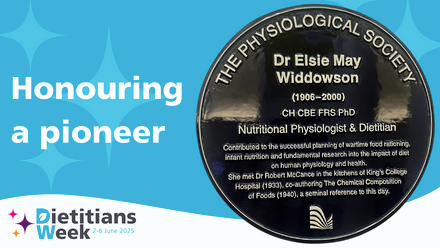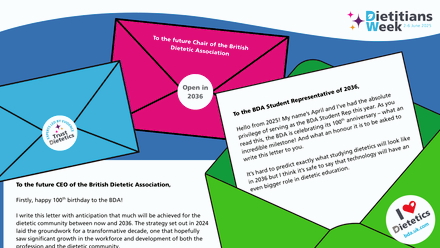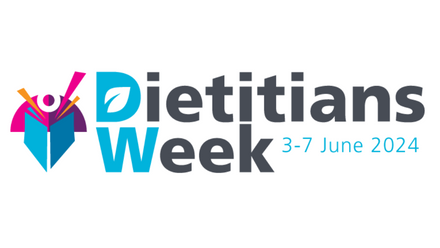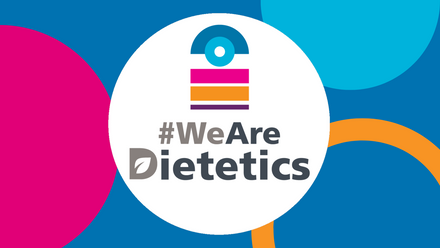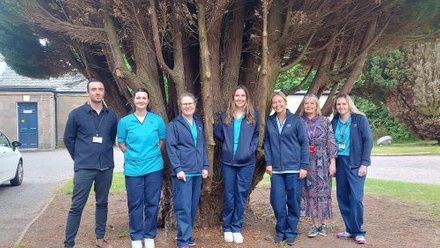Three BDA members of varying levels of experience gaze into their crystal balls to see what the future might hold for the profession.
How far we have come
Sian O’Shea, Former BDA Chair
As we celebrate another Dietitians' Week, I would like to share just two advances in dietetic practice which I have encountered during my fifty-plus years as a dietitian in the NHS.
My first post gave me the opportunity to work on the medical renal wards and Artificial Kidney Unit. The Giovanetti diet (20g protein based on high biological value protein – two eggs) was still being used for those in chronic renal failure, with an uplift to 40gm/day on dialysis.
Strict fluid, sodium and potassium restrictions were used to lessen the load on the patient’s failing renal function. High-protein, low-sodium diets were used for those with nephrotic syndrome.
This has all changed to where we are now, with the rapid advancement in pharmacology, dialysis and our knowledge based on emerging research. Dietitians haven’t been passive passengers along this progression as their own clinical inquiry and research have contributed to and influenced the dynamic change in the dietetic management of renal disease. The renal ward was just one of many within my portfolio; specialists in renal and other aspects of clinical practice came much later.
The significant advances in enteral feeding have been off the scale. Prior to 1978, a variety of tube feeds and supplements were made up in the diet kitchen. We had over 30 recipes for feeds (which were made up from milk, raw eggs, cream, glucose syrup and vitamin drops) made daily to be administered to patients via bolus (poured down a funnel into a Ryles tube).
I encountered my first tin of commercial tube feed when I worked in New Zealand in 1976. I remember the first fine bore n/g tube, which was such an advancement, but initially we didn’t have the administration sets. Together with nursing and pharmacy, we developed our own using sterilised Winchester glass bottles, the smallest Ryles tube we could find and lots of surgical tape to minimise leakages. We set the administration rate of feed by counting drops per ml (no pumps then).
A far cry from the range of feeds, tubes and pumps that we use today.
And what of the future?
An MSc in Nutrition & Dietetics will become the minimum qualification as a registered dietitian. Dietitians will continue to develop their professional standing as autonomous practitioners in current and new specialist areas, e.g. neurosciences, genetically tailored dietetic interventions – maybe even space nutrition?
Research will be integral in every dietetic role. Experienced dietitians will be supplementary/independent prescribers applicable to their clinical area of expertise.
But there is one aspect of clinical practice that will continue to dominate the dietetic landscape for many years to come: malnutrition. In health and disease, we strive to assess, evaluate and correct/improve nutritional imbalance on an individual and global scale.
Sian O’Shea
Former Chair, BDA
Dietitians will always be part of the future
Sian Porter, Consultant dietitian
According to science fiction, the future of nutrition was supposed to be about replacing food with pills. True, there are some questionable promises of green powders available today, but space-age food has materialised rather differently with examples such as ‘fake meat’ from lab-grown food.
So we need more than ever to keep up with future innovations in food, retail and consumer trends, such as nutrition and health claims, out-of-home food delivery services, supplements and novel ingredients, as well as strategy and policy that impact nutrition.
Advances in genomics, medical screening, diagnostics and research, including the microbiome, will continue, enabling dietitians to offer even more tailored or ‘precision’ dietary advice.
Unlike influencers, celebrities or some subscription services, we need convincing data whose application we fully understand before using it in clinical practice.
Technology such as wearable devices, mobile health apps, and telehealth platforms will advance. White-label versions are being used by and developed for the NHS. These enable dietitians to advise and monitor patients remotely in real time at scale and share data.
There are downsides, such as the recent popularity in continuous glucose monitoring as a lifestyle choice rather than a medical necessity, meaning that dietitians will be as busy as ever busting myths or soothing the worried well.
Will dietitians be replaced by robots or chatbots? Artificial intelligence (AI) will help balance supply and demand and improve efficiency by reducing time spent on administrative tasks and resources whilst improving impact and influence via improved communication and appropriate messaging.
For example, AI enables complex data such as foods suitable for someone with a specific allergy to be iterated, sorted and recommended in an instant – data that was published in paper lists when I first qualified.
But it is a case of ‘rubbish in equals rubbish out’, so dietitians will need to develop skills in prompt engineering to ask the right search questions and verify the output as well as be aware of the risks of AI for them and their patients/clients.
Social media is unstoppable, and thankfully many dietitians use these platforms for the good. The challenge of cutting through the nutrition noise has and will always exist.
Being heard and seen in society, where attention is a highly valued commodity and fact-checking minimal, will be harder and harder. Shock and superlatives relating to nutrition – biggest, smallest, freakiest, most disgusting, most perfect have never been more of a test.
How do we compete? We call them out but don’t join in this race to the bottom. Empathy, relevance, trust and fact will help and regulation and legislation must play their part too.
The clinical dietitian will become part of a smaller, highly specialist workforce working with complex cases that need extra support. This in turn may require more training and experience to deliver this higher care than the entry-level we have presently.
Sustainable diets reflecting current environmental concerns and ethical considerations are a crucial part of nutrition advice. Dietitians can be instrumental in educating and helping people and businesses to reduce their future environmental impact through their dietary choices, including reducing food waste and supporting agriculture.
The future will always need us to question what has gone before and challenge our beliefs and biases, leading to the constant evolution needed in the profession.
More dietitians have higher qualifications. More entrants to the profession have had previous careers which bring transferable skills that can be shared and utilised. New training schemes such as apprenticeships bring an added dimension to the opportunities and roles for dietitians in the future.
Everyone has to eat, and most people have an interest in and views on food. This will never go away, meaning dietitians in some way or another will be part of the future.
Sian Porter
Consultant dietitian
Opportunities and challenges for today’s students
Nat Leeman, Dietetics student, University of Surrey
With the healthcare system evolving to meet the challenges of shifting population demographics, there are plenty of opportunities and challenges for future dietitians.1 These include advancing nutritional science, embracing technology, prioritising preventative care, promoting sustainable food systems and expanding roles within healthcare.
Nutritional sciences
Nutritional sciences are rapidly evolving, offering opportunities for disease prevention and treatment. Research in areas like nutrigenomics, the gut microbiome, plant-based and functional foods and personalised nutrition points to a future of more targeted and sustainable healthcare.2, 3
These developments highlight the need for more dietitians to be key players in interdisciplinary healthcare teams and public health policy. As future dietetic professionals, staying engaged with emerging research and committed to lifelong learning will be key to making meaningful contributions across healthcare.
Technology
With the growing use of technology in healthcare, there is opportunity for dietitians to integrate digital tools such as apps, wearables and telehealth platforms into practice. These tools offer new ways to monitor and support patients remotely, improving accessibility.4
As future professionals, we need to be prepared to embrace digital tools so that we can use data effectively while maintaining ethical standards. It’s exciting to think about how technology has the potential to strengthen patient health outcomes.
Preventative healthcare
The growing emphasis on preventative care means dietitians will play a central role in promoting healthy lifestyles. As the government focuses on preventative healthcare models, there will likely be an increased demand for dietitians helping prevent chronic diseases through nutrition.5
This shift presents valuable opportunities for students to build skills in preventative health, nutrition education and community engagement.
Sustainability and advocacy
Concerns about climate change have positioned dietitians to become involved in advocating for sustainable food systems, plant-based eating and ethical food sourcing.6 This could reshape dietary guidelines that benefit personal and planetary health.
Dietitians may contribute towards influencing policy changes regarding food systems, school lunch programmes and nutrition education.7
Expanded roles within healthcare
Dietitians’ roles continue to grow, from the prescribing route of first contact dietitians to the need for more dietitians in primary care networks, mental health services, prisons, sports, education, corporate settings, health tech companies and food innovation.8
These expanding roles offer students exciting post-graduate pathways and development opportunities.9
As a student, I feel that the future holds exciting possibilities.
Nat Leeman
Dietetics student - University of Surrey
References
- BDA. Future Dietitian 2025 Report. [Internet]. 2022 [cited 2025 Apr 15]. Available from: https://www.bda.uk.com/resource/developing-the-workforce-through-education.html
- Cuenca MH, Proaño GV, McDermid JM, El Shikieri AB, Steeves EA, Carrillo-Alvarez E, Fracassi P, Garelick DS, Brewer J, Kazimierczuk FK and Steiber A. Advancing Nutrition and Dietetics Research in Global Food and Nutrition Security: A Roundtable Meeting Report. Journal of the Academy of Nutrition and Dietetics [Internet]. 2024 Jan [cited 2025 Apr 14]; 124(1): 102-122. Available from: https://doi.org/10.1016/j.jand.2023.09.022.
- Bassaganya-Riera J, Berry EM, Blaak EE, Burlingame B, le Coutre J, van Eden W , El-Sohemy A, German JB, Knorr D, Lacroix C, Muscaritoli M, Nieman DC, Rychlik M, Scholey A and Serafini M. Goals in Nutrition Science 2020-2025. Frontiers in Nutrition [Internet]. 2021 Feb [cited 2025 Apr 14]; 7: Article number 606378. Available from: https://doi.org/10.3389/fnut.2020.606378
- Limketkai B N, Mauldin K, Manitius N, Jalilian L and Salonen B R. The Age of Artificial Intelligence: Use of Digital Technology in Clinical Nutrition. Current Surgery Reports [Internet]. 2021 Jun [cited 2025 Apr 13]; 9(20):1-13. Available from: https://doi.org/10.1007/s40137-021-00297-3
- BDA. Strategic Vision: New AHP Public Health Strategic Framework. [Internet] 2025 Jan 22 [cited 2025 Apr 14]. Available from: https://www.bda.uk.com/resource/strategic-vision-new-ahp-public-health-strategic-framework.html
- Browne S, Corish C, Nordin S and Carlsson L. Sustainability informed dietetics education: key messages for educators and national dietetics associations. Journal of Human Nutrition and Dietetics. [Internet] 2024 Jun 09 [cited 2025 Apr 15]; 37(4):909-918. Available from: https://doi-org.surrey.idm.oclc.org/10.1111/jhn.13322
- BDA. Campaigns. [Internet]. 2025 [cited 2025 Apr 15]. Available from: https://www.bda.uk.com/news-campaigns/campaigns.html
- Mackenzie M, Newman E. A Reflection On: Preparing the Dietetic Workforce of the Future – Developing Innovative Placements in Social Care Settings. IJPBL [Internet]. 2024 Jan. 15 [cited 2025 Apr. 15];11(2):60-71. Available from: https://publications.coventry.ac.uk/index.php/pblh/article/view/1037
- BDA. BDA Learning Zone. [Internet] 2025 [cited 2025 Apr 15]. Available from: https://www.bda.uk.com/practice-and-education/education/cpd/bda-learning-zone.html



